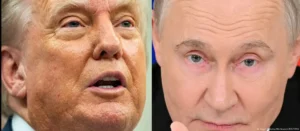Ahead of a potential Trump-Putin summit, EU leaders emphasized that Ukraine should play a key role in peace negotiations, while Kyiv reports making limited territorial advances along its border with Russia.
Hungary’s Orban rejects EU statement on Ukraine
Hungarian Prime Minister Viktor Orban, the sole EU leader to withhold support for a declaration urging Ukrainian and European participation in peace talks, defended his stance by claiming it sought to “set conditions for a meeting to which EU leaders were not invited.”
In a post on X, formerly Twitter, Orban lamented that “the fact that the EU was left on the sidelines is sad enough,” adding that it would be worse “if we started providing instructions from the bench.”
He argued that the “only sensible” approach for EU leaders would be to call for an EU-Russia summit, modeled on the planned US-Russia meeting.
Ukraine’s Fate in the Balance: EU Unity, Orban’s Dissent, and Rising Tensions Ahead of Trump-Putin Talks
As the war in Ukraine grinds into yet another tense chapter, political maneuvering in Europe and abroad is shaping the conversation about peace — and raising critical questions about who gets a seat at the negotiating table.
EU Leaders Stand United — Almost
In the run-up to the anticipated meeting between U.S. President Donald Trump and Russian President Vladimir Putin in Alaska this Friday, European Union leaders have reaffirmed their support for Ukraine’s right to determine its own future.
Twenty-six out of the EU’s 27 member states signed a joint declaration urging that any peace agreement must respect Ukraine’s sovereignty, territorial integrity, and independence under international law. The statement firmly rejected the idea that international borders can be altered by force and insisted that Ukraine’s voice must be central in shaping any deal.
However, one voice broke the chorus — Hungarian Prime Minister Viktor Orban. Known for his pro-Moscow stance, Orban refused to back the declaration, criticizing it as an attempt to set conditions for a meeting from which EU leaders themselves were excluded. He suggested that instead of making demands from the sidelines, the EU should pursue its own summit with Russia, modeled after the planned U.S.-Russia talks.
Why Orban’s Position Matters
Orban has long been an outlier in EU policy toward Russia, opposing military aid to Ukraine and denouncing sanctions on Moscow as ineffective and damaging to European economies. His recent visit to Moscow in 2024, during Hungary’s presidency of the European Council, further strained relations with Brussels. EU officials were quick to stress that he did not represent the bloc in any official capacity during that trip.
His refusal to sign the joint statement once again underscores the fractures within the EU over how to handle the war — a division Moscow has often been accused of exploiting.
Trump-Putin Summit: Excluding Ukraine?
The upcoming Trump-Putin meeting has sparked unease among European leaders and deep concern in Kyiv. Trump has hinted that a peace deal might require both sides to cede territory — an idea Ukraine firmly rejects.
Compounding the anxiety is the fact that neither Ukraine nor European representatives are expected to attend the talks. For many EU leaders, this exclusion is alarming, as they see the war not just as Ukraine’s fight, but as a direct threat to Europe’s security.
Almut Möller, director for European and global affairs at the European Policy Centre, told DW that the issue goes to the “very core of European security,” warning that the outcome of such negotiations could have far-reaching consequences for the continent.
Kyiv Pushes Back on Moscow’s Advances
On the ground, Ukraine continues to fight back. In the eastern Sumy region, Ukrainian forces have reclaimed the villages of Stepne and Novokostiantynivka, following the earlier recapture of Bezsalivka. Top commander Oleksandr Syrskyi described the situation as “tough” but said Ukrainian troops are making progress in pushing back Russian forces.
Meanwhile, near Pokrovsk in Donetsk, Kyiv has denied reports of a Russian breakthrough, insisting that small enemy infiltrations do not equate to territorial control. Still, the battle for Pokrovsk remains intense, with the city at risk of encirclement.
Dark Realities Behind the Frontlines
Beyond the battlefield, disturbing reports are emerging. Investigations claim that child labor is being used in the production of Russian drones, mass-produced in Tatarstan for use in attacks on Ukrainian cities.
In the occupied Luhansk region, residents face severe shortages of water and electricity, rising food prices, and mounting pressure to adopt Russian citizenship — a snapshot of life under Moscow’s grip.
Military Posturing in Belarus
Adding to regional tensions, Russia and Belarus are set to hold joint military drills in mid-September, a move Minsk insists is defensive. However, fears persist that the exercises could be used as a pretext for aggression against neighboring countries. Ukrainian President Volodymyr Zelenskyy has previously warned that Russia may be “preparing something” under the guise of such drills.
The Stakes Couldn’t Be Higher
With the Trump-Putin summit looming, Europe finds itself caught between supporting Ukraine’s fight for sovereignty and managing its own strategic interests. The exclusion of Ukraine and EU leaders from Friday’s talks has sparked fears that decisions affecting the continent’s security could be made without those most impacted having a voice.
As the war enters its third year, one thing is clear: the path to peace in Ukraine remains fraught with uncertainty, and the decisions made in the coming days could shape the security architecture of Europe for years to come.
